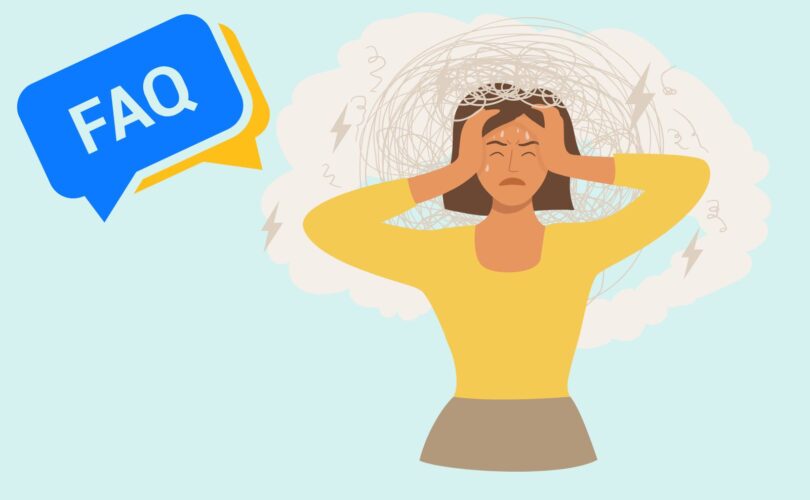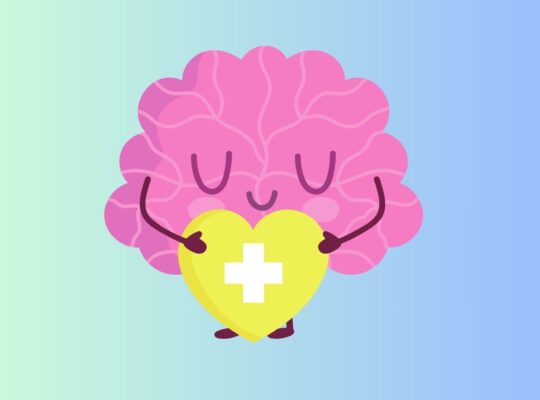Stress is a common experience that impacts millions of people worldwide. Whether it’s caused by work-related stress, relationship problems, financial pressures, or health problems, stress can have a significant impact on physical and mental health.
In this report, we will address frequently asked questions about stress and its impact on our bodies and minds.
From identifying the signs of stress to discussing effective strategies for stress management, this report aims to provide a comprehensive understanding of stress and how to prevent and manage it.
26 Stress FAQ
1| What Is Stress?
According to Mayo Clinic stress is the body’s response to a challenge or demand, whether it be physical or psychological. When faced with stress, the body produces a hormone called cortisol that prepares the body to respond to the stressor. While acute stress can be helpful in certain situations, chronic stress can have a significant impact on physical and mental health.
Common causes of stress include:
- Work-related stress
- Relationship problems
- Financial pressures
- Health problems
- Overwhelm and being too busy
- Environment related stress
- Emotional burdens
- Psychological stressors
Understanding what stress is and how it impacts the body and mind is crucial for managing stress and preventing negative health outcomes.
2| What Is Chronic Stress Versus Acute Stress?
The American Psychological Association categorizes stress as either acute or chronic. Acute stress is a short-term response to a stressor and is a normal part of the body’s response to a challenge. Acute stress can be beneficial in certain situations, such as in response to a physical threat.
Chronic stress, on the other hand, is a long-term response that can have a more significant impact on physical and mental health. Chronic stress is often caused by ongoing stressors without any stress management intervention.
Understanding the difference between acute and chronic stress is crucial for managing stress and preventing negative health outcomes.
3| How Does Stress Affect The Body?
When faced with stress, the body produces a hormone called cortisol that prepares the body to respond to the stressor. While acute stress can be helpful in certain situations, chronic stress can lead to negative health outcomes.
Chronic stress can increase blood pressure and heart rate, decrease immune system function, and cause physical symptoms such as headaches, fatigue, and digestive problems.
4| What Is Psychological Stress?
Psychological stress is stress caused by psychological factors such as work-related stress, relationship problems, financial stress, or major life changes. Psychological stress can impact mental health and well-being, leading to negative outcomes such as anxiety, depression, and burnout.
While it has been found by The American Psychological Association that some level of psychological stress is normal and can even be motivating, chronic psychological stress can have a significant impact on physical and mental health. Understanding what psychological stress is and how it impacts the body and mind is crucial for managing stress and preventing negative health outcomes.
5| What Are The Health Risks Of Prolonged Chronic Stress?
Here are the top health risks associated with prolonged chronic stress pointed out by Mayo Clinic:
- Anxiety
- Depression
- Digestive problems
- Headaches
- Muscle tension and pain
- Heart disease, heart attack, high blood pressure and stroke
- Sleep problems
- Weight gain
- Memory and concentration impairment
Understanding the health risks of prolonged chronic stress is crucial for managing stress and preventing negative health outcomes.
6| What Are Physical Signs And Symptoms Of Chronic Stress?
Common physical signs of chronic stress include:
- Sudden weight loss or weight gain
- Existing physical health problems getting worse
- Headaches
- Muscle tension
- Sleep problems
- Difficulty breathing
- Panic attacks
- Fatigue
- Digestive problems
- Blurred eyesight or sore eyes
- Poor sleep
Chronic stress can also lead to an increased risk of:
- Health problems such as heart disease
- Diabetes
- Obesity
Physical symptoms of chronic stress can be particularly concerning, as they can impact an individual’s ability to perform daily activities and decrease their quality of life.
7| What Are The Signs Of Psychological Stress?
Psychological stress can manifest itself in different ways compared to other kinds of stress. Common signs of psychological stress can include irritability, anxiety, and difficulty sleeping.
Individuals may also experience changes in appetite, mood swings, and feelings of overwhelm or helplessness. Chronic psychological stress can have a significant impact on mental health and well-being, increasing the risk of mental health problems such as depression, anxiety, and burnout.
8| How Does Stress Affect Mental Health?
The most significant impact stress can have on our life could be on our mental health. Stress triggers a physiological response in the body that can disrupt cognitive function and emotional regulation.
Chronic stress can lead to structural changes in the brain and increase the risk of mental health problems such as depression and anxiety. Stress can cause individuals to feel overwhelmed and helpless, leading to negative thought patterns and reduced self-esteem.
Additionally, chronic stress can impact sleep, further exacerbating mental health problems. While some levels of stress is normal and can even be motivating, chronic stress can have a significant impact on mental health and well-being. Managing stress effectively is crucial for maintaining good mental health and preventing negative mental health outcomes.
9| How Can Stress Be Prevented?
While it may be impossible to completely avoid stress, here are some various strategies highlighted by Harvard Medical School that individuals can use to manage and prevent stress.
- Engage in regular exercise: Exercise has been shown to be an effective stress reducer by increasing endorphins and reducing cortisol levels.
- Practice relaxation techniques: Techniques such as meditation, deep breathing, and yoga can help reduce stress and promote relaxation.
- Practice time management: Managing time effectively can help reduce stress by decreasing feelings of overwhelm and increasing productivity.
- Seek social support: Talking to friends and family and seeking support can help reduce stress and improve mental health.
- Get enough sleep: Getting adequate sleep is crucial for managing stress and maintaining good physical and mental health.
- Engage in hobbies and activities: Engaging in hobbies and activities that bring joy and fulfillment can help reduce stress and promote well-being.
- Maintain a healthy lifestyle: Eating a healthy diet, limiting alcohol and caffeine intake, and avoiding smoking can all contribute to better stress management.
By incorporating these strategies into daily life, individuals can manage stress more effectively and prevent negative health outcomes associated with chronic stress.
10| Stress Is Typically Considered A Negative Experience, Can It Be A Positive One?
While stress is often considered a negative experience, it can also be a positive one. According to The Berkeley Well-Being Institute positive stress, also known as eustress, can motivate and energize individuals to achieve their goals.
Eustress can help individuals feel excited and challenged, leading to increased motivation and productivity. For example, the stress of preparing for a job interview or presentation can lead to increased focus and drive, ultimately leading to success.
However, it’s important to note that chronic stress is still a negative experience that can have a significant impact on physical and mental health. Understanding the difference between positive and negative stress is crucial for managing stress effectively and preventing negative health outcomes.
11| What Causes The Most Stress?
The causes of stress can vary greatly from person to person, as each individual has unique stressors and coping mechanisms.
However, some common sources of stress include:
- Work-related stress: Work-related stress is a common source of stress, often caused by factors such as a heavy workload, difficult coworkers, or high-pressure deadlines.
- Financial stress: Financial stress can be caused by factors such as debt, job loss, or unexpected expenses.
- Relationship problems: Relationship problems with family, friends, or partners can cause stress.
- Major life changes: Major life changes such as marriage, divorce, or the death of a loved one can cause stress.
- Health problems: Health problems can cause stress, especially if they are chronic or require ongoing treatment.
Understanding the sources of stress is crucial for managing stress effectively and preventing negative health outcomes. By identifying sources of stress, individuals can take steps to manage stress and prevent negative health outcomes.
12| How Can I Avoid Stress In My Life?
Avoiding stress can be a challenging task, but there are several tips and strategies that individuals can incorporate into their daily lives to manage stress effectively. One tip is to practice mindfulness, which involves being present in the moment without judgment.
Another is to prioritize self-care by engaging in activities that promote physical and mental health, such as exercise, healthy eating, and adequate sleep. Learning to say no to unnecessary commitments and identifying and challenging negative thought patterns can also help reduce stress.
Additionally, connecting with others and practicing gratitude can help shift focus away from stressors and promote a more positive outlook. By incorporating these strategies into daily life, individuals can manage stress more effectively and prevent negative health outcomes associated with chronic stress.
13| What Life Changes Can Influences Stress?
Life changes, whether positive or negative, can influence stress levels. Some common life changes that can cause stress include:
- Moving to a new home: Moving can be a major source of stress, as it involves a significant change in routine and often requires a great deal of planning and preparation.
- Starting a new job: Starting a new job can be stressful, as it often involves learning new skills and adjusting to a new work environment.
- Relationship changes: Relationship changes, such as the end of a romantic relationship or the loss of a loved one, can cause significant stress and emotional distress.
- Financial changes: Financial changes, such as job loss or debt, can cause stress and anxiety.
- Health changes: Health changes, such as the diagnosis of a chronic illness or injury, can cause stress and uncertainty.
If you find yourself preparing to make one of these life altering changes, be prepared to take on additional stress. However, there are plenty of ways to help you with this new journey you find yourself embarking on!
14| Why Am I Always Stressed?
If you are always feeling stressed, there may be various reasons behind it. Ongoing stressors in your life, such as work-related stress, relationship problems, or financial stress, can contribute to chronic stress. Additionally, certain personality traits, such as perfectionism, can contribute to feelings of stress and anxiety. Physical health problems, such as chronic pain or illness, can also contribute to feelings of stress.
In some cases, mental health problems such as depression or anxiety may be the underlying cause of chronic stress. Identifying the root cause of your stress is crucial for effectively managing it. Seeking support from friends, family, or a mental health professional can be helpful in identifying the causes of your stress and developing effective strategies for managing it.
15| Am I Feeling Stress Or Anxiety?
It can be difficult to distinguish between feelings of stress and anxiety, as the two can share many similar symptoms. According to the Mayo Clinic, stress is typically a response to a specific stressor, such as a deadline or an upcoming event.
Stress can manifest as physical symptoms such as tension headaches, muscle aches, or digestive problems. Anxiety, on the other hand, is a more generalized feeling of worry or fear, often without a specific trigger.
Healthline says anxiety can cause physical symptoms such as chest tightness, shortness of breath, and increased heart rate. It’s important to note that while some level of stress and anxiety are normal, chronic stress or anxiety can have a significant impact on physical and mental health. If you are experiencing ongoing feelings of stress or anxiety, it may be helpful to seek support from a mental health professional.
16| Can You Die From Stress?
The physiological response triggered by stress can cause changes in the body that can increase the risk of various health problems, including cardiovascular disease, high blood pressure, and digestive issues. According to the University of Houston these health problems can become fatal if left untreated or unmanaged for an extended period.
Chronic stress can also take a toll on mental health, leading to an increased risk of depression, anxiety, and other mental health disorders which can lead to suicide.
In some cases, chronic stress can lead to unhealthy coping mechanisms such as substance and alcohol abuse, which can put your life at risk.
It’s important to manage stress effectively to prevent negative health outcomes associated with chronic stress. This can include practicing relaxation techniques, exercising regularly, engaging in hobbies, and seeking social support. Identifying and addressing sources of stress is crucial for managing stress effectively and preventing negative health outcomes.
17| Can Stress Cause Memory Loss?
When the body experiences stress, it triggers a physiological response that releases hormones such as cortisol and adrenaline. These hormones can have negative effects on the brain, including impairing memory function. Stress can also lead to decreased focus and attention, which can further contribute to memory difficulties.
Chronic stress can have an even greater impact on memory function. Prolonged stress can cause damage to the hippocampus, the part of the brain responsible for memory formation and retrieval.
Chronic uncontrolled stress can have an even greater impact on memory function. Prolonged stress can cause damage to the hippocampus, the part of the brain responsible for memory formation and retrieval. (Stress effects on the hippocampus: a critical review; Eun Joo Kim, et al)
18| What Is Brain Fog?
Brain fog is a term used to describe a feeling of mental confusion or difficulty focusing.
It can be caused by a variety of factors, including stress, lack of sleep, poor nutrition, and certain medical conditions.
Brain fog can affect cognitive function, including memory, attention, and decision-making.
One common cause of brain fog is stress. The physiological response triggered by stress can have negative effects on the brain, including impairing cognitive function.
Lack of sleep and poor nutrition can also contribute to brain fog.
Medical conditions such as depression, anxiety, and chronic fatigue syndrome can also cause brain fog. These conditions can have a significant impact on mental health, leading to feelings of fatigue, difficulty concentrating, and other cognitive difficulties.
19| What Is Burnout?
Burnout is a condition characterized by feelings of emotional, physical, and mental exhaustion. It’s often caused by prolonged exposure to stress, particularly in the workplace, and can have a significant impact on an individual’s quality of life.
Symptoms of burnout can include feelings of detachment, cynicism, and a lack of motivation. Physical symptoms can include fatigue, insomnia, and headaches. Burnout can also affect cognitive function, leading to difficulty concentrating, memory problems, and decreased productivity.
Burnout is often caused by work-related stressors such as heavy workloads, long hours, and a lack of control over one’s work environment. Other factors that can contribute to burnout include a lack of social support, high-pressure environments, and a lack of work-life balance.
20| What Is The Difference Between Stress And Burnout?
While stress and burnout are often used interchangeably, they are two distinct conditions that differ in both their causes and symptoms.
Stress is a natural response to a stressor, such as a deadline or an upcoming event. It’s typically short-term and can be a motivating force to help individuals accomplish tasks.
Symptoms of stress can include physical symptoms such as tension headaches, muscle aches, and digestive problems, as well as emotional symptoms such as irritability, anxiety, and depression.
Burnout, on the other hand, is a long-term response to chronic stressors, such as work-related stress. It’s characterized by feelings of exhaustion, detachment, and a lack of motivation. Symptoms of burnout can include physical symptoms such as fatigue, insomnia, and headaches, as well as emotional symptoms such as cynicism and a decreased sense of accomplishment.
21| What Is The Relationship Between Stress And Aging?
Stress can have a significant impact on the aging process, affecting both physical and cognitive function. The physiological response triggered by stress can cause changes in the body that can accelerate the aging process.
Chronic stress can contribute to a range of physical health problems that are commonly associated with aging, including cardiovascular disease, diabetes, and osteoporosis. Additionally, chronic stress can lead to inflammation in the body, which can contribute to the development of age-related diseases and impair overall physical function.
Stress can also have a negative impact on cognitive function, including memory and attention according to Harvard Medical School. Chronic stress can lead to shrinkage in the prefrontal cortex, the part of the brain responsible for decision-making and problem-solving, which can contribute to cognitive decline.
22| What Is The Relationship Between Stress And Weight Gain?
Stress can have a significant impact on weight gain and overall metabolic function. The physiological response triggered by stress can lead to changes in the body that can contribute to weight gain and a decreased ability to lose weight.
One way that stress can contribute to weight gain is through increased cortisol production. Cortisol is a hormone that’s released in response to stress, and it can increase appetite and promote the storage of fat in the body. This can contribute to weight gain, particularly in the abdominal area.
Additionally, stress can also contribute to unhealthy eating habits, such as overeating or reaching for high-calorie, high-fat foods as a coping mechanism. Stress can also lead to decreased physical activity, which can further contribute to weight gain.
23| Can Stress Impact My Relationships?
Stress is a common experience in our daily lives and can have a significant impact on our relationships. When we experience stress, our physiological response triggers changes in behavior and communication that can negatively affect our relationships with others, both romantic and platonic.
One of the most common ways that stress can impact relationships is by causing individuals to become irritable, frustrated, and angry. When we’re stressed, it’s easy to lash out at those around us, which can lead to conflict and strained relationships, particularly with loved ones.
Stress can also contribute to decreased empathy and emotional regulation, making it difficult to communicate effectively and connect with others. This can further strain relationships and contribute to feelings of isolation and disconnection.
24| What Are Effective Strategies To Manage Stress?
—————
Engage in relaxation techniques:
- Deep breathing
- Meditation
- Tai chi
- Yoga
Engage in regular exercise:
- Walking/Running
- Cycling
- Gym
- Swimming
- Dancing
- Aerobics
- Yoga
——–
Practice self-care: adequate sleep, eating a healthy diet, and engaging in enjoyable activities.
Prioritize time management by managing your schedule, setting realistic goals and prioritizing.
Progressive Muscle Relaxation
Maintain social support
Take breaks regularly throughout the day.
Seek professional help if stress levels are significantly impacting daily life or mental health.
————————
Managing stress effectively requires identifying and addressing the underlying causes of stress. By prioritizing stress-management techniques and healthy habits, we can reduce stress levels and improve overall well-being. With the right strategies and support, it’s possible to manage stress effectively and prevent negative health outcomes associated with chronic stress.
25| What Are Unhealthy Ways To Manage Stress?
Stress is a common experience in our daily lives, and while it’s important to manage stress effectively, some individuals turn to unhealthy methods to cope with stress. These unhealthy methods can have negative consequences on physical and mental health and can worsen stress levels over time.
Here are some unhealthy ways to manage stress:
- Overeating: Overeating or binge eating can be a common coping mechanism for stress, but it can lead to weight gain and negative health outcomes.
- Substance abuse: Substance abuse, such as alcohol or drugs, can temporarily relieve stress, but it can lead to addiction and worsen mental health over time.
- Ignoring stress: Ignoring stress and avoiding confronting the underlying causes can worsen stress levels and contribute to negative health outcomes.
- Poor sleep habits: Poor sleep habits, such as staying up late or not getting adequate sleep, can worsen stress levels and contribute to negative health outcomes.
- Isolating oneself: Isolating oneself from social support can worsen stress levels and contribute to negative mental health outcomes.
- Procrastination: Procrastination can contribute to increased stress levels and worsen productivity over time.
- Avoiding problems: Avoiding problems or not addressing the underlying causes of stress can worsen stress levels and contribute to negative health outcomes.
While these methods may provide temporary relief from stress, they can lead to negative physical and mental health outcomes and worsen stress levels over time. It’s important to identify healthy methods for managing stress, such as exercise, meditation, and social support.
26| What Are Signs That I Should Seek Professional Help For My Stress?
Stress is a common experience in our daily lives, and while it’s important to manage stress effectively, it’s not always easy to know when to seek professional help.
Here are some signs that you should seek professional help for your stress:
- Ongoing, intense stress: If stress levels are significantly impacting daily life, it may be helpful to seek support from a mental health professional.
- Physical symptoms: Chronic stress can contribute to a range of physical symptoms, such as headaches, muscle tension, and digestive problems. If you’re experiencing ongoing physical symptoms, it may be helpful to seek support from a healthcare professional.
- Changes in mood: Stress can contribute to changes in mood, such as irritability, depression, or anxiety. If you’re experiencing ongoing changes in mood, it may be helpful to seek support from a mental health professional.
- Decreased quality of life: If stress levels are significantly impacting daily life and decreasing overall quality of life, it may be helpful to seek support from a mental health professional.
- Difficulty managing stress: If you’re struggling to manage stress effectively or finding that your coping mechanisms are not helping, it may be helpful to seek support from a mental health professional.
- Interference with relationships: If stress levels are negatively impacting relationships with friends or loved ones, it may be helpful to seek support from a mental health professional.
If you’re experiencing any of these signs, it may be helpful to seek support from a mental health professional. A mental health professional or your doctor can help identify the underlying causes of stress and provide strategies for managing stress effectively.
By prioritizing self-care and seeking support when needed, we can manage stress effectively and promote overall well-being.







